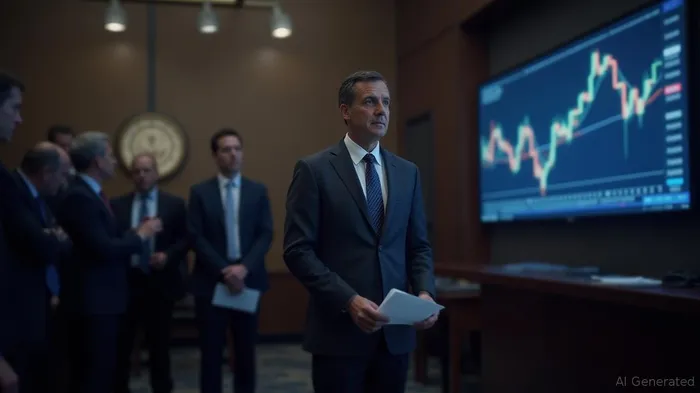Bitcoin News Today: SEC approves then pauses Bitwise crypto ETF conversion as $1.68B index fund enters regulatory limbo
The U.S. Securities and Exchange Commission (SEC) has sparked confusion by approving and immediately halting the conversion of Bitwise’s Bitwise 10 Crypto Index Fund into a spot exchange-traded fund (ETF). The agency’s division of trading and markets granted an accelerated approval for the conversion on Tuesday, allowing the firm to expedite the process. However, the decision was swiftly paused by the SEC, with Assistant Secretary Sherry Haywood stating the agency would review the delegated action. This abrupt reversal leaves the $1.68 billion fund, which holds exposure to bitcoinBTC-- (BTC), ether (ETH), and other cryptocurrencies, in regulatory limbo.
The Bitwise 10 Crypto Index Fund, which has operated as a “grants-backed” trust since 2017, is structured to mirror a multi-asset ETF if approved. The fund allocates 90% of its assets to BTC and ETH, with the remaining 10% spread across tokens such as SolanaSOL-- (SOL), XRPXRP--, and Cardano (ADA). Its potential conversion would have marked the first U.S. approval of a crypto index ETF. However, the SEC’s intervention—citing Rule 431, which allows the full commission to review staff decisions—has delayed finality. The agency did not immediately respond to requests for comment.
The SEC’s actions mirror its treatment of Grayscale’s Digital Large Cap Fund (GDLC), which received initial approval last year before being paused. Both decisions used identical language, indicating a deliberate strategy to delay final approvals while establishing criteria for crypto ETFs. Analysts speculate the SEC may be using these cases to set precedents, particularly for funds including tokens without standalone ETF approvals, such as XRP and ADAADA--. The approach suggests a preference for a “sequential” framework, where approvals for individual assets precede diversified portfolios.
Industry observers have raised concerns about the SEC’s inconsistency. Bloomberg ETF analyst Eric Balchunas noted the agency might be stalling to finalize generic listing standards for crypto ETFs, potentially delaying approvals until October. Similarly, Scott Johnsson of Van Buren Capital speculated the pause could be a tactic by SEC Chair Gary Gensler’s team to circumvent the 240-day statutory approval period. “This kind of maneuvering shouldn’t happen under the current leadership,” Johnsson remarked. Nate Geraci of NovaDius Wealth Management called the situation “bizarre,” emphasizing the regulatory uncertainty for market participants.
The implications for the crypto market are significant. While a BITW ETF conversion could have offered investors diversified exposure to major cryptocurrencies, the SEC’s pause reinforces perceptions of regulatory unpredictability. For now, the agency’s discretionary review under Rule 431 ensures no multi-asset crypto ETF will launch until the SEC reaches a consensus on criteria. This delay may deter institutional participation but also forces the industry to address structural challenges, such as custody protocols and market manipulation risks, historically cited by the SEC as concerns.
With multiple crypto ETF applications pending—including proposals from Franklin Templeton and Fidelity—the SEC’s approach underscores its dual role as gatekeeper and arbiter. The agency’s focus on balancing innovation with investor protection remains unclear, leaving the BITW case as a cautionary tale of regulatory delays. For investors, the path to mainstream adoption of crypto ETFs remains fraught with unanswered questions, as the SEC continues to navigate the complex interplay between fostering innovation and ensuring market integrity.

Quickly understand the history and background of various well-known coins
Latest Articles
Stay ahead of the market.
Get curated U.S. market news, insights and key dates delivered to your inbox.



Comments
No comments yet